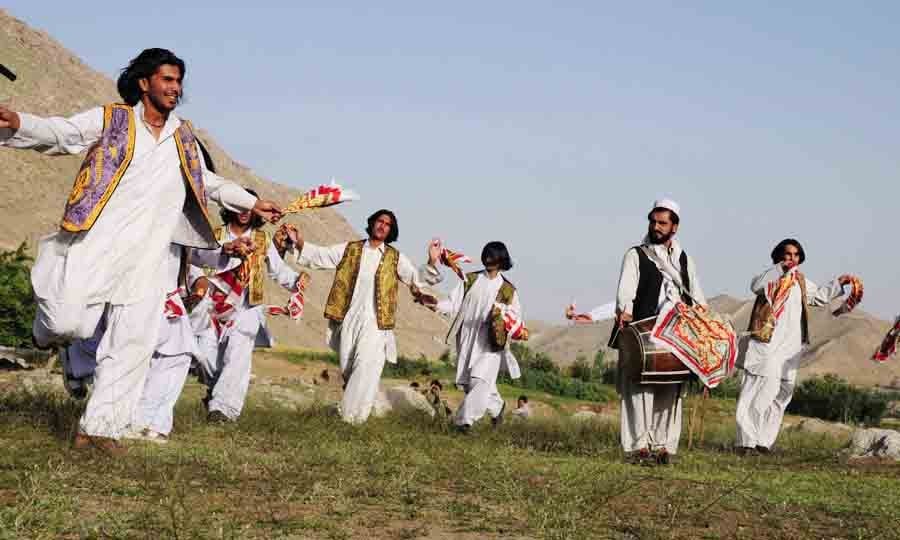
A time honoured Pakhtun cultural dance, Attan is being criminalised as vulgarity

Attan is a time honoured Pakhtun cultural dance. It is unthinkable not to perform it at different occasions like weddings, the resolution of disputes and blood feuds. It is also a war dance. In olden times, it was done to raise the morale of warriors before launching attacks on enemy camps.
The dance varies from region to region having many shades: the Wazir, the Kakar, the Nasar, Turi/Kurrmwal, Marwat, Mangal, Wardak tribes all perform Attan slightly differently. An important ingredient of the Pakhtunwali, Attan was also performed by women, and this form was known as ‘bragai attan’. However, some destroyers of culture and the sheer power of time ensured that women are excluded from this dance and their participation in this culture began to be looked down upon.
On March 21, Pakhtun students in the University of the Punjab gathered to showcase their culture and perform Attan. However, some supremacist fellow students forcefully and brazenly stopped them. This show of force by the self-proclaimed puritans resulted in a brutal clash, and a temporary closure of the university.
That this cultural display was dubbed immoral and un-Islamic is reminiscent of the Taliban rule in Afghanistan. Moreover, that this occurred in the ‘heart of Pakistan’ i.e. Lahore, is outrageous. The action was condemned by some and defended by others, as per their own weltanschauung. One leader of a religio-political party stated that wherever there would be dance on the campus, there would be a tussle.
The forceful prevention of the Pakhtun cultural activity resulted in reactions from other Pakistani universities, such as ones in Gomal and Peshawar. It also galvanised a section of political and social activists who organised a grand show of Attan in Peshawar’s Bagh-i-Naran Park on April 7. An organiser of the event, Tariq Afghan, demanded that March 21 should be declared as international "Attan Day".
Stephen R. Covey, an American educator, author, and businessman, once said that "Culture gives one identity and personality. It gives spiritual, intellectual and emotional distinction." However, the clashers tend to forget that Pakistan is a federation that is home to many cultures, such as Punjabi, Sindhi, Baloch and many others.
The clashers seem to be fired with the zeal of "culture hegemony". By culture hegemony, Antonio Gramsci, an Italian Marxist theoretician, means controlling one culture and collective will. "The essence of the concept of hegemony is the appropriation of culture by a dominant class for the sake of social control, not the identification of culture with sheer class power."
In parts of Khyber Pakhtunkhwa, Attan has been criminalised to such an extent in the eyes of some sections of Pakhtuns -- due to fundamentalism, extremism and jihadi culture, with allied religious movements like the tableeghi jammat, Wahhabism and so on -- that it is considered domtob, a Pashtu word roughly translated as vulgarity or immorality.
A personal experience here is pertinent to mention. A couple of days ago, I attended a marriage ceremony in Peshawar. Some friends decided to do Attan. However, those who considered themselves more ‘sophisticated’, shied away and said joining in the dance would belittle their standing in society. It is indeed tragic that people have begun to look down upon their harmless cultural mores and ethos.
Hating others’ culture or imposing one’s own culture on others is a form of terrorism, and it prevents us from understanding each other and living in harmony. Marcus Garvey, a Jamaican political leader, publisher, journalist, entrepreneur, and orator, says, "A people without the knowledge of their past history, origin and culture is like a tree without roots." Preservation of one’s culture shows their love for themselves. It doesn’t mean disrespect for someone else’s culture.
In addition to its cultural value, Attan is also a source of fun, harmony and togetherness. It provides Pakhtuns with the opportunity to share their joy at important moments. William Glasser, an American psychiatrist, is right when he says that "We [humans] are driven by five genetic needs -- survival, love and belonging, power, freedom and fun." Without Attan, any event is like food without salt.
Culturally awakened people are not a threat to anyone, rather it is supremacists bent upon vandalism who are a menace to society. Paulo Coelho de Souza, a Brazilian lyricist and novelist, writes that "Culture makes people understand each other better. And if they understand each other better in their soul, it is easier to overcome their economic and political barriers." Our salvation and progress lies not in obscurantism and obstructionism but in peaceful coexistence, respect for each other ideals and cultural values.
The example of Afghanistan is in front of us. It suffered because of this traditionalist versus progressive polarisation and dichotomy. Amanullah Khan, who was the Amir of Afghanistan from 1919 to 1929, tried to bring about changes in his country which was being controlled by the religious establishment; the latter stood in arms and overthrew the Amir plunging Afghanistan into an abyss. India found a panacea for its diversity in secularism, though it’s afflicted by the virulence of some extremist groups and parties. Malaysia, a multiracial and multicultural country is perfectly at peace and has progressed due to its pluralism and secularism. In short, beauty lies in diversity and strength lies in differences.